
Lionel Barrymore was an American actor of stage, screen and radio as well as a film director. He won an Academy Award for Best Actor for his performance in A Free Soul (1931), and is known to modern audiences for the role of villainous Mr. Potter in Frank Capra's 1946 film It's a Wonderful Life.
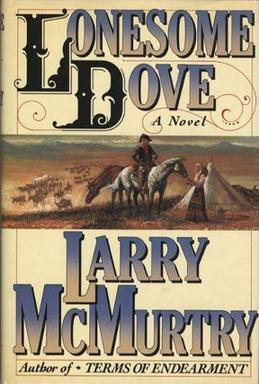
Lonesome Dove is a 1985 Western novel by American writer Larry McMurtry. It is the first published book of the Lonesome Dove series and the third installment in the series chronologically. It was a bestseller and won the 1986 Pulitzer Prize for Fiction. In 1989, it was adapted as a TV miniseries starring Tommy Lee Jones and Robert Duvall, which won both critical and popular acclaim. McMurtry went on to write a sequel, Streets of Laredo (1993), and two prequels, Dead Man's Walk (1995) and Comanche Moon (1997), all of which were also adapted as TV series.

Breckin Meyer is an American actor. He is best known for his roles in films such as Clueless (1995), The Craft (1996), Road Trip (2000), Rat Race (2001), and Ghosts of Girlfriends Past (2009). He played Jon Arbuckle in the live-action Garfield movies. He also voiced Joseph Gribble in King of the Hill (2000–2010), starred as Jared Franklin in Franklin & Bash (2011–2014), and has provided various character voices and writing to the stop motion animated sitcom Robot Chicken (2005-Present).
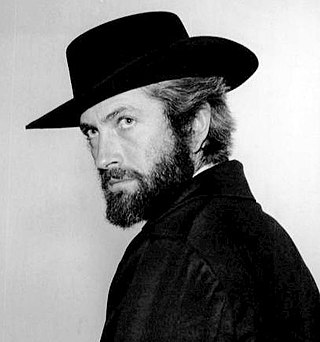
John Drew Barrymore was an American film actor and member of the Barrymore family of actors, which included his father, John Barrymore, and his father's siblings, Lionel and Ethel. He was the father of four children, including actor John Blyth Barrymore and actress Drew Barrymore. Diana Barrymore was his half-sister from his father's second marriage.

Theodore Childress "Chill" Wills was an American actor and a singer in the Avalon Boys quartet.
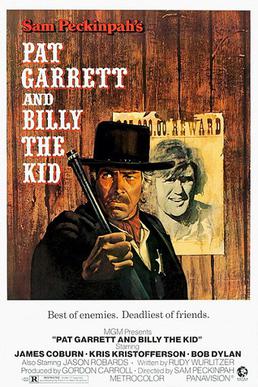
Pat Garrett and Billy the Kid is a 1973 American revisionist Western film directed by Sam Peckinpah, written by Rudy Wurlitzer, and starring James Coburn, Kris Kristofferson, Richard Jaeckel, Katy Jurado, Chill Wills, Barry Sullivan, Jason Robards, Slim Pickens and Bob Dylan. The film is about an aging Pat Garrett (Coburn), hired as a lawman by a group of wealthy New Mexico cattle barons to bring down his old friend Billy the Kid (Kristofferson).
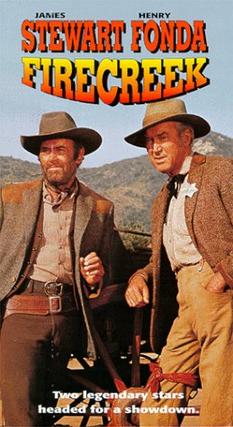
Firecreek is a 1968 American Western film directed by Vincent McEveety and starring James Stewart and Henry Fonda, the latter in his first of two roles that year as a villain. The film is similar to High Noon in that it features an entire town that refuses to help a peace officer against outlaws. Stewart plays an unlikely hero, forced into action when his conscience will not permit evil to continue. The supporting cast features Inger Stevens, Dean Jagger, Ed Begley, Jay C. Flippen, Jack Elam and John Qualen.

The Cowboys is a 1972 American Western film starring John Wayne, Roscoe Lee Browne, and Bruce Dern, and featuring Colleen Dewhurst and Slim Pickens. It was the feature film debut of Robert Carradine. Based on the 1971 novel of the same name by William Dale Jennings, the screenplay was written by Irving Ravetch, Harriet Frank, Jr., and Jennings, and the film was directed by Mark Rydell.

John Farrell MacDonald was an American character actor and director. He played supporting roles and occasional leads. He appeared in over 325 films over a four-decade career from 1911 to 1951, and directed forty-four silent films from 1912 to 1917.

The Limited Series is a box set released by American country music artist Garth Brooks, released by Pearl Records on May 5, 1998.

Saratoga is a 1937 American romantic comedy film starring Clark Gable and Jean Harlow and directed by Jack Conway. The screenplay was written by Anita Loos. Lionel Barrymore, Frank Morgan, Walter Pidgeon, and Una Merkel appear as featured players; Hattie McDaniel and Margaret Hamilton appear in support. It was the sixth and final film collaboration of Gable and Harlow.
Alan Brown Le May was an American novelist and screenplay writer.

Look Homeward, Angel is a 1957 stage play by the playwright Ketti Frings. The play is based on Thomas Wolfe's 1929 largely autobiographical novel of the same title.

Cowboy from Brooklyn is a 1938 American Western musical romantic comedy film directed by Lloyd Bacon and written by Earl Baldwin. It stars Dick Powell, Pat O'Brien and Priscilla Lane. The film was based on the 1937 Broadway play Howdy Stranger by Robert Sloane and Louis Pelletier.
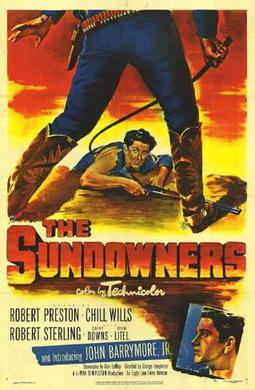
The Sundowners is a 1950 American Technicolor Western film directed by George Templeton, starring Robert Preston and featuring John Drew Barrymore, Robert Sterling, Chill Wills, and Jack Elam. The film is also known as Thunder in the Dust in the United Kingdom.

The Lucky Horseshoe is a 1925 American silent Western film directed by John G. Blystone and starring Tom Mix, Billie Dove, and Malcolm Waite. Based on a story by Robert Lord, the film is about a ranch foreman who assumes responsibility for the ranch following the owner's death. He also cares for the owner's daughter who is taken to Europe by an aunt. Two year later the woman returns from Europe with her new wealthy fiancée and plans to hold their wedding at the ranch, which the foreman has turned into a successful tourist destination. The foreman's feelings for the woman have not been diminished by the years, and after learning some damaging information about the fiancée, the foreman must find a way to stop the wedding.

Born to the Saddle is a 1953 American Western film directed by William Beaudine.
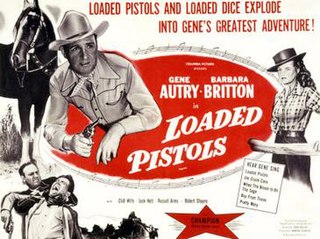
Loaded Pistols is a 1948 American Western film directed by John English and starring Gene Autry, Barbara Britton, and Chill Wills. Written by Dwight Cummins and Dorothy Yost, the film is about a cowboy who protects a young man wrongly accused of murder, while trying to find the real badguys.
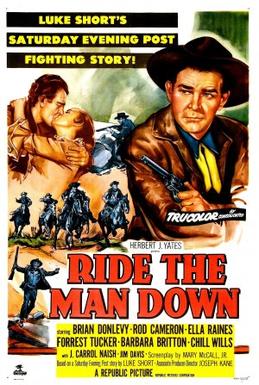
Ride the Man Down is a 1952 American Western film directed by Joseph Kane, written by Mary C. McCall, Jr., and starring Brian Donlevy, Rod Cameron, Ella Raines, Forrest Tucker, Barbara Britton, Chill Wills and J. Carrol Naish. The film was released on November 25, 1952, by Republic Pictures.

The Champion Film Company was an independent production company founded in 1909 by Mark M. Dintenfass. The studio was one of the film companies that merged to form Universal Pictures.


















